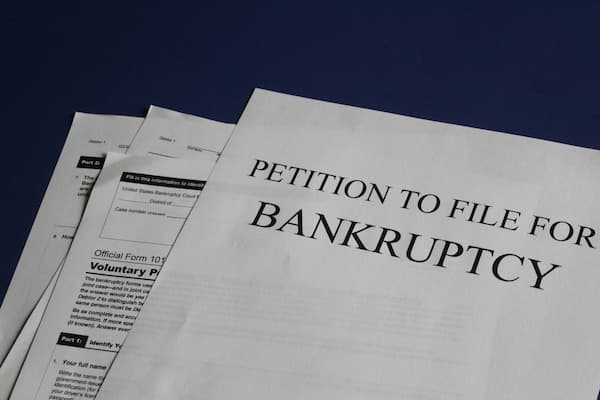How Long Does Chapter 7 Bankruptcy Stay On Your Credit Report?
Chapter 7 bankruptcy will stay on your credit report for 10 years.
We could have simply stopped this article after answering the question, but that wouldn’t have been much help. Understanding the length of time a personal bankruptcy stays on your credit report can be helpful. Knowing ways to improve your credit score post bankruptcy is even more beneficial.
What is Chapter 7 bankruptcy?
Chapter 7 bankruptcy is a legal process that helps you erase debt and get a clean slate financially. It is often referred to as “liquidation” bankruptcy because you will end up selling off assets to settle debts that are not erased. This is in contrast to Chapter 13 bankruptcy, which restructures your debt and enables you to pay one payment to cover all of your debts.
Not everyone is eligible to file Chapter 7 bankruptcy. Your eligibility to file depends on your ability to pass the means test, which examines your assets, liabilities and compares your income to the median income in the state. If your income is below the median, then you most likely will qualify.
It is important to note that once you file Chapter 7 bankruptcy, there is an automatic stay put in place on your debts. This means that any collection activity must stop. This includes:
- Wage garnishment
- Collection calls
- Lawsuits
- Mailed collections letters
- Other activities creditors take to recover debts
Chapter 7 bankruptcy provides filers with relief from their overwhelming debt and gives them the opportunity to rebuild their financial lives.

What is the impact on your credit score after filing for Chapter 7 bankruptcy?
If you are filing Chapter 7 bankruptcy, it is likely the case that your credit score isn’t good. Filing will initially lower your score and it will stay on your credit report for 10 years. So does this mean your credit score will remain terrible for 10 years?
No.
In fact, studies show that while yes, your credit score will be lower after filing personal bankruptcy, your score can recover quickly following successful discharge of your case. The Federal Reserve Bank of Philadelphia published a report that showed most bankruptcy filers’ scores returned to pre bankruptcy levels or slightly better within 18 months of discharge.
While this can happen simply by time passing, certain actions you take in the wake of your bankruptcy discharge can accelerate your credit score improvements.
Ways to improve your credit score after Chapter 7 bankruptcy
Let’s look at different steps you can take to improve your credit score, which is especially important after you have filed for bankruptcy. While some of the tips below might sound like common sense, it is important to adhere to good financial behaviors to improve your credit score.
After Chapter 7 bankruptcy, it is important to make payments on time
Paying your bills on time is important regardless of whether or not you have filed for bankruptcy, but it is extremely important after your bankruptcy discharge, as you are trying to improve your credit score. On-time payments are a major factor in credit reporting, and all credit bureaus monitor this.
Keep most of your credit limit available after Chapter 7 bankruptcy
Let’s say you have $40,000 in available credit. If you use $39,000 of it, you are using 97.5% of your available credit. Not only does it help to have credit available for emergency situations, but “credit utilization” is also one of the most important factors in determining your credit score.
The general rule of thumb is to keep your balances under 30% of your total credit limit. So if you have a combined $40,000 credit limit, keep your use under $12,000. Ideally, try to stay between 10-20% just to be safe and keep some credit available for emergencies.
Get a credit builder loan, credit card or a secured credit card
Many companies offer these financial products as a way for you to build your credit history. There are small loans with lower interest rates or cards with low spending limits (usually between $250-$750) that can help you build up your payment history and improve your credit score.
Secured credit cards work a little differently. You can put an amount as security on the card (usually limited at $250 or $500) and then use the card. From there, you’ll make payments like you would on a normal credit card, with your deposit serving as your credit limit.

Ideally, you’ll want to borrow from companies that report to all three credit bureaus in order to get your payment history on file with them.
Other Ways to Build Your Credit After a Bankruptcy
Alternatively, you can also become an authorized user on someone else’s credit card. This option essentially allows you to piggyback your credit score off the score of someone with good credit. Many parents are doing this with their teens in order to help them establish credit quicker, and if you have a close friend or family member that is willing to allow you to be an authorized user on their account, this can be a solution for you to improve your credit score as well.
If you run into a situation where you need access to credit, such as getting a car loan or mortgage, then having a co-signer can be a solution to these issues. However, just be careful. You are asking someone to put their credit history on the line for you, so be sure to make timely payments on your loan and practice good financial habits. Otherwise, you will certainly damage you co-signers credit and potentially your relationship with them.
Thinking of filing for Chapter 7 bankruptcy? Contact The Mitten Law Firm today for a free consultation to explore your options.
Recent Posts
- Navigating Wayne County Friend of the Court
- Hidden Assets and Financial Infidelity in Divorce
- Child Custody Modifications
- Divorce for Healthcare Professionals
- Child Custody & Frequent Work Travel
- Divorce for Small Business Owners: Essential Considerations
- Professional Licenses, Degrees, & Credentials in Divorce
- Protecting Your Assets In Divorce: A Guide for Professionals
- Shift Work & Custody: Parenting Plans That Work for Your Schedule
- Holiday Custody Concerns: What Michigan Parents Should Know
